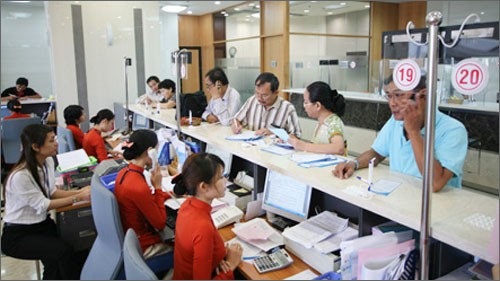The Vietnam Business Forum, an annual event on the sidelines of the Consultative Group meeting of donors, opened in Hanoi on Friday. This year the meeting focuses on measures to restructure the Vietnamese economy, laying a foundation for its sustainable growth.
According to a World Bank report released on Wednesday, Vietnam’s macro economy has been basically stabilized thanks to the government’s efforts. The government’s resolution No11 on inflation control and macro-economic stabilization has proved to be effective, resulting in slower inflation in recent months. Industrial and service sectors have grown sharply, boosting overall growth. Rising food and commodity prices in the world have encouraged Vietnam’s exports. The banking sector’s tight and prudent monetary policies have kept the growth rate of liquidity and credits within targets. The World Bank report says these initial results will make it easier for Vietnam to pursue its economic stabilization policies.
 |
| Vietnam is urged to restructure its banking sector |
However, economists say Vietnam cannot be satisfied with fragile stability. In the medium and long term, the country has to overcome such challenges as its budget deficit and high foreign debt. Other financial risks include high credit growth and interest rates as well as the banking system’s poor risk management. World Bank Country Director Victoria Kwakkwa urged Vietnam to give top priority to bank restructure, which she said will help the country restore a sustainable economic environment and pave the way for efficient growth: “There are some factors that I think should be taken into account: the broader issue of supervision of the banking sector, strengthening the capacity of the central bank in its role as overseer of the sector to monitor risks, to engage with banks around the issue that are risky, issues around building the capacity of the banks themselves, to do business and ways that are sound and ways that avoid or mitigate some of the risks”.
Ms. Kwakkwa said the World Bank, the International Monetary Fund and the International Financial Center have discussed with the Vietnamese government ways to reevaluate the national banking system for further reforms. Restructure of state-owned enterprises, or SOEs, is a major agenda item of the on-going Vietnam Business Forum and next week’s Consultative Group meeting of donors. Economists say SOE restructure should be taken step by step and in parallel with the restructure of the financial and banking system and public investment. Le Hai Mo, Deputy Director of the Institute of Financial Strategy & Policy says the move doesn’t mean abandoning SOE but it does mean accelerating national economic development: “State-owned enterprises should be restructured and their areas of operation need to be clarified. SOEs should assume the role of serving economic development, speeding up economic restructure process and enhancing economic competitiveness”.
Vietnam’s economy is predicted to grow 5.8% this year, a relatively impressive figure given the global economic recession. But Vietnam still needs to restructure its economy, which means lower growth in the near term. At the upcoming Consultative Group meeting of donors, foreign partners and the Vietnamese government will seek additional ways to improve the national economy, which should be less dependent on foreign aids.
Anh Huyen